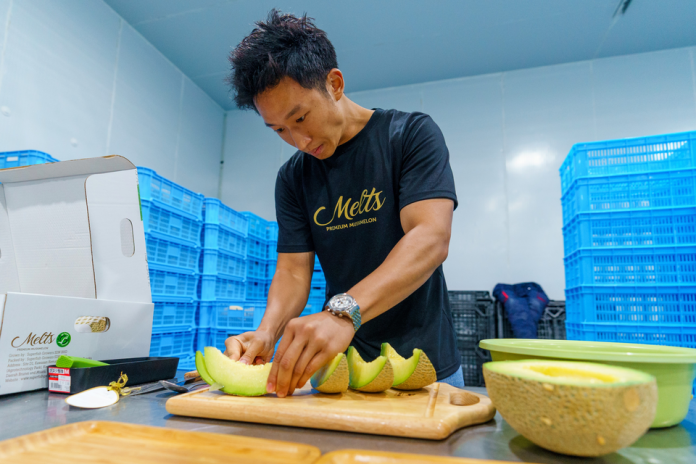
Superfish Growers are targeting to export their premium ‘Melts’ muskmelons to China’s biggest fruit chain Pagoda in 2020 following the retailer’s visit to Sultanate and a protocol agreement between the governments of Brunei and China on phytosanitary requirements.
Co-founder and CTO of Superfish Lee Wei Sheng said Pagoda – who plan to grow from more than 3,000 to 10,000 stores by 2020 – have indicated that they can “easily absorb” 5,000 metric tonnes of muskmelon from Superfish annually, which would be worth approximately $50 million.
“This volume (5,000 to 6,000 metric tonnes) will require 50 greenhouses,” said Lee. “The demand (from China’s side) has exceeded our expectations, and we need to be more aggressive in growing our production. To meet it, we are setting a target of building 10 new greenhouses (annually) over the next five years.”
Superfish has spent more than $3 million to set up nine greenhouses this year – along with a centralized water pump and cold storage facility – capable of producing 600 metric tonnes of Japanese Arus muskmelon annually, considered to be the world’s most expensive melon.




The muskmelon seeds are imported from Japan, then germinated in a nursery for 10 days before being transplanted to the greenhouse where they grow for another 40 days before being hand pollinated. Only one fruit is left to ripen on each tre, ensuring maxium care and nutrient uptake.
The target of 50 greenhouses is nearly double Superfish’s initial plan to operate 27 greenhouses by 2023 which would yield 1,200 metric tonnes annually.
Lee said their 50-hectare site under the Ministry of Primary Resources and Tourism’s (MPRT) Bio-Innovation Corridor in Tungku can comfortably accommodate the 50 greenhouses, at least half which they will be opening to investors and sub-leasing for contract farmers.
Lee also thanked MPRT for playing a critical role in facilitating their export to China by signing the protocol on phytosanitary requirements – which cover the health and safety of imported agricultural produce.
“Although we have begun exporting to Malaysia, Singapore, Japan and Hong Kong, our main target for export has always been China as it is the market with the most demand, where our melons can be the most competitive,” said Lee, who expects 80% of their future sales to come from China.
“However there were some challenges in getting the certifications and requirements to export to China. The government-to-government linkages have enabled us to have a clear understanding of what is needed and how we can proceed.”






Lee said Brunei’s competitive advantage is its hot tropical climate which enables four, 90-day planting cycles annually, against the more seasonal planting in Japan and China. The high prices of muskmelon owe largely to the specialty conditions it’s farmed under as well as the high demand for it in East Asian markets.
Each ‘Melts’ melon – which typically weighs 1.5kg – is individually measured for a minimum level of 15% sweetness after harvesting, with dense, web-like patterns on its surface indicating tenderness of a premium grade.
“The muskmelons (left to grow) on their own achieve won’t achieve the form that can fetch premium prices,” said Eileen Lee, who is also Superfish’s Managing Director.
“We farm the melons vertically on a raised bed (separate from the ground) where we can control the moisture and fertiliser content through fertigation. Each vine or plant only bears one melon to ensure that it receives the optimal nutrition, and we are checking on the plants every 30 minutes from 6am to 6pm.”
The Lee siblings – Malaysians who grew up in Brunei – decided to set up the farm after discovering the fruit in Japan where it can fetch over $100 and is often purchased as a gift or served in high-end restaurants.
The siblings ventured into the agricultural industry by manufacturing a line of organic fertilisers called Superfish in 2013, which made use of seafood byproducts from their family’s business Gropoint Sdn Bhd.











